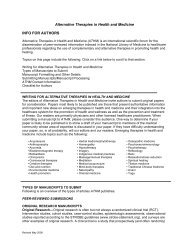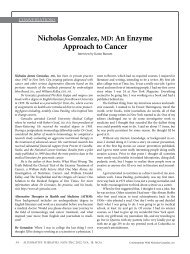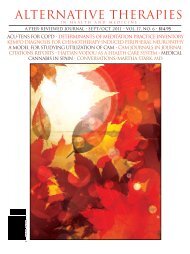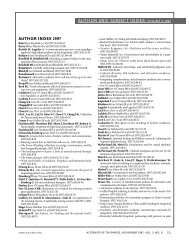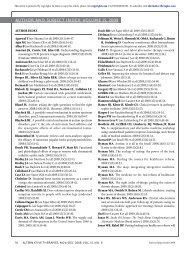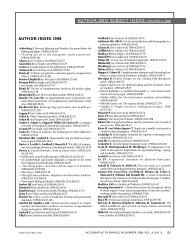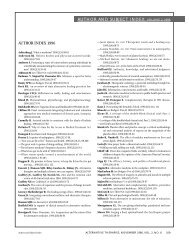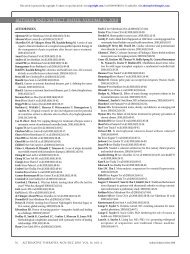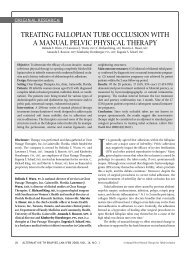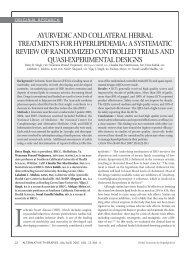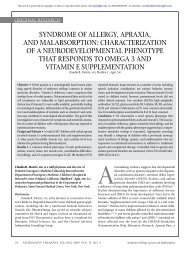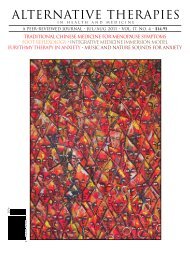Alternative Therapies In Health And Medicine
Alternative Therapies In Health And Medicine
Alternative Therapies In Health And Medicine
Create successful ePaper yourself
Turn your PDF publications into a flip-book with our unique Google optimized e-Paper software.
markers for disease risk. Furthermore, recent studies have shown<br />
that alternative approaches to stress reduction such as yoga 17,18 and<br />
meditation 19-21 can likewise influence chronic disease risk. Research<br />
has shown that improving health behaviors can lead to improvement<br />
in overall health and well-being; however, individuals desiring<br />
to better their health often face obstacles when it comes to<br />
initiating and maintaining changes in behavior. An integrative<br />
health model may help overcome these hurdles through supportive<br />
patient partnerships that focus on identifying and implementing<br />
lifestyle changes based upon personal values and goals.<br />
<strong>In</strong>tegrative health professionals trained in coaching can support<br />
and promote this process by building trusting relationships with<br />
patients that encourage personal growth, enhance motivation, and<br />
promote self-efficacy. 22<br />
There has been only limited investigation into the effectiveness<br />
of a patient-centered program that combines multiple strategies<br />
into a whole-person paradigm for disease risk reduction. 23,24<br />
Accordingly, the aim of the current study was to evaluate patient<br />
outcomes from an integrative health program designed to provide<br />
holistic, patient-centered care and incorporate conventional and<br />
complementary medicine approaches for the reduction of chronic<br />
disease risk.<br />
METHODS<br />
Study Design<br />
A prospective observational study design was used to assess<br />
changes in modifiable disease risk, patient activation, and behavioral<br />
and psychosocial measures after an integrative medicine health<br />
program. This program included two principal components: a<br />
3-day health immersion phase conducted at an academic integrative<br />
medicine facility and a support phase consisting of telephonic<br />
health coaching and monthly didactic sessions on health topics.<br />
The research protocol was approval by the Duke University Medical<br />
Center <strong>In</strong>stitutional Review Board.<br />
Participants<br />
Participants included 63 individuals (33 male and 30 female)<br />
who provided written informed consent and attended a discounted,<br />
self-paid 3-day health immersion program at Duke <strong>In</strong>tegrative<br />
<strong>Medicine</strong>. Participation was limited to members and employees of<br />
an early retirement community in South Carolina, all literate in<br />
English and 18 years of age or older. <strong>In</strong>dividuals were excluded if<br />
they were pregnant, had severe psychiatric disease, a cognitive<br />
impairment (eg, dementia, Alzheimer’s disease), or other conditions<br />
that would limit their ability to provide informed consent.<br />
<strong>In</strong>tervention<br />
Phase I: 3-day <strong>Health</strong> Immersion. During the health immersion,<br />
participants spent 3 days at the <strong>In</strong>tegrative <strong>Medicine</strong> center,<br />
participating in a variety of conventional and complementary therapies<br />
including nutritional counseling, acupuncture, massage, exercise<br />
training, yoga, and mind-body therapy (Table 1). Classes and<br />
individual consultations focused on topics identified on the Duke<br />
<strong>In</strong>tegrative <strong>Medicine</strong> (IM) Wheel of <strong>Health</strong> (Figure 1). 25 This model<br />
centers on mindfulness and includes topics related to both professional<br />
care (eg, pharmaceuticals/supplements, preventive medicine,<br />
and conventional/CAM treatments) and self-care (eg,<br />
mind-body connection, movement/exercise, nutrition, physical<br />
environment, relationships, and personal growth/spirituality). A<br />
team of health care providers worked with each participant individually<br />
to develop a personalized health plan 26 corresponding to the<br />
10 integral areas of health identified on the Wheel of <strong>Health</strong> (Figure<br />
1). During the 3 days, participants also met with health coaches to<br />
reflect on personal goals and values as well as to refine and implement<br />
the health plan. Thus by the end of the immersion, participants<br />
had established a comprehensive multimodal plan for<br />
implementing lifestyle changes.<br />
Phase II: Support Phase. After completing the health immersion,<br />
participants were provided with follow-up integrative health<br />
coaching (IHC) by telephone. IHC is a relatively recent addition to<br />
the field of coaching. 22 The IHC model builds upon elements of life<br />
coaching such as appreciative inquiry 27 and motivational interviewing<br />
28 and in addition helps patients explore motivation to move<br />
toward whole-person health as conceptualized by the Wheel of<br />
<strong>Health</strong> (Figure 1). Specifically, IHC strives to link desired lifestyle<br />
changes with personal values and mission.<br />
Masters-level professionals trained in IHC performed the<br />
TABLE 1 Duke <strong>In</strong>tegrative <strong>Medicine</strong> Three-day <strong>Health</strong><br />
Immersion Program<br />
1. <strong>In</strong>troduction to <strong>In</strong>tegrative <strong>Medicine</strong>, information on the Three-day<br />
<strong>Health</strong> Immersion program, description of personalized health planning,<br />
and explanation of the Duke <strong>In</strong>tegrative <strong>Medicine</strong> Wheel of <strong>Health</strong><br />
2. <strong>In</strong>dividual integrative physician consultations<br />
• New patient consultation on day 1 (80 min)<br />
• Follow-up consultation on day 3 (30 min)<br />
3. <strong>Health</strong> coaching<br />
• Three group coaching sessions (50 min each) or one individual<br />
coaching session via phone (90 min)<br />
4. <strong>In</strong>dividual fitness assessment (60 min)<br />
5. <strong>In</strong>dividual manual therapies<br />
• Acupuncture or acupressure (60 min)<br />
• Massage (60 min)<br />
6. Group movement classes<br />
• Yoga (60 min)<br />
• Qigong (60 min)<br />
7. Nutrition consultation and education<br />
• <strong>In</strong>dividual integrative nutrition consult with registered dietician (60 min)<br />
• Nutrition class: <strong>In</strong> Search of the Optimal Diet (60 min)<br />
8. <strong>Health</strong>ful cooking class (60 min)<br />
9. <strong>In</strong>dividual mind/body consultation (60 min)<br />
10. Group mindfulness classes<br />
• <strong>In</strong>troduction to mindfulness-based meditation (60 min)<br />
• Mindful-eating lunch (60 min)<br />
11. Program conclusion and final reflection (group setting)<br />
All subjects participated in the above health-related activities during a<br />
3-day period between January and March 2008.<br />
Disease Risk Improves With <strong>In</strong>tegrative Immersion Model<br />
ALTERNATIVE THERAPIES, jul/aug 2011, VOL. 17, NO. 4 39



